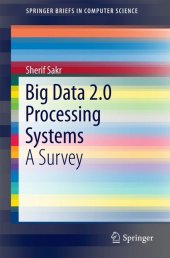 Neuerscheinungen 2016Stand: 2020-02-01 |
Schnellsuche
ISBN/Stichwort/Autor
|
Herderstraße 10
10625 Berlin
Tel.: 030 315 714 16
Fax 030 315 714 14
info@buchspektrum.de |

Sherif Sakr
Big Data 2.0 Processing Systems
A Survey
1st ed. 2016. 2016. xv, 102 S. 49 SW-Abb. 235 mm
Verlag/Jahr: SPRINGER, BERLIN; SPRINGER INTERNATIONAL PUBLISHING 2016
ISBN: 3-319-38775-8 (3319387758)
Neue ISBN: 978-3-319-38775-8 (9783319387758)
Preis und Lieferzeit: Bitte klicken
This book provides readers the "big picture" and a comprehensive survey of the domain of big data processing systems. For the past decade, the Hadoop framework has dominated the world of big data processing, yet recently academia and industry have started to recognize its limitations in several application domains and big data processing scenarios such as the large-scale processing of structured data, graph data and streaming data. Thus, it is now gradually being replaced by a collection of engines that are dedicated to specific verticals (e.g. structured data, graph data, and streaming data). The book explores this new wave of systems, which it refers to as Big Data 2.0 processing systems.
After Chapter 1 presents the general background of the big data phenomena, Chapter 2 provides an overview of various general-purpose big data processing systems that allow their users to develop various big data processing jobs for different application domains. In turn, Chapter 3 examines various systems that have been introduced to support the SQL flavor on top of the Hadoop infrastructure and provide competing and scalable performance in the processing of large-scale structured data. Chapter 4 discusses several systems that have been designed to tackle the problem of large-scale graph processing, while the main focus of Chapter 5 is on several systems that have been designed to provide scalable solutions for processing big data streams, and on other sets of systems that have been introduced to support the development of data pipelines between various types of big data processing jobs and systems. Lastly, Chapter 6 shares conclusions and an outlook on future research challenges.
Overall, the book offers a valuable reference guide for students, researchers and professionals in the domain of big data processing systems. Further, its comprehensive content will hopefully encourage readers to pursue further research on the subject.
Chapter 1: Introduction.- Chapter 2: General Purpose Big Data Processing Systems.- Chapter 3: Large Scale Processing of Structured Databases.- Chapter 4: Large Scale Graph Processing Systems.- Chapter 5: Large Scale Stream Processing Systems.- Chapter 6: Conclusions and Outlook.
Sherif Sakr is an academic, professional specialist and consultant of Big Data systems. He received his PhD degree in Computer and Information Science from Konstanz University, Germany in 2007. He received his BSc and MSc degrees in Computer Science from the Information Systems department at the Faculty of Computers and Information in Cairo University, Egypt, in 2000 and 2003 respectively. In 2013, Sherif has been awarded the Stanford Innovation and Entrepreneurship Certificate.
He is currently a professor of computer and information science in the Health Informatics department at King Saud bin Abdulaziz University for Health Sciences. He is also affiliated with the University of New South Wales and DATA61/CSIRO (formerly NICTA). In 2008 and 2009, Sherif held an Adjunct Lecturer position at the Department of Computing of Macquarie University. In 2011, he held a Visiting Researcher position at the eXtreme Computing Group, Microsoft Research Laboratories, Redmond, WA, USA. In 2012, he held a Research MTS position in Alcatel-Lucent Bell Labs.
Sherif has published more than 90 refereed research publications in international journals and conferences. So far, he (co)-authored three books and co-edited three other books.


